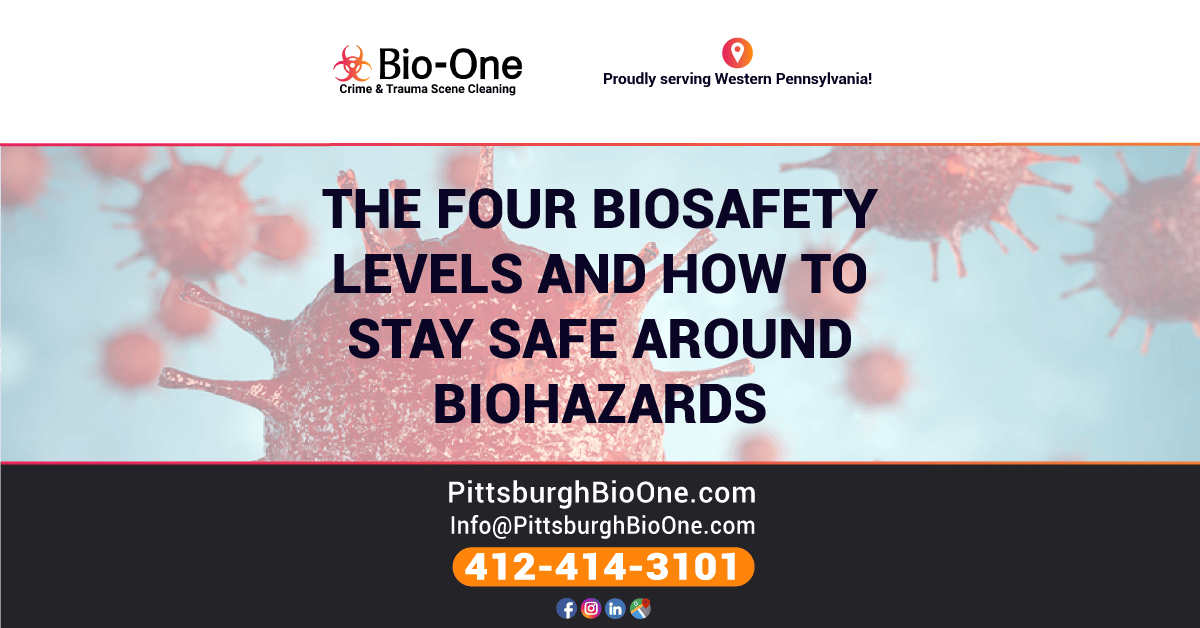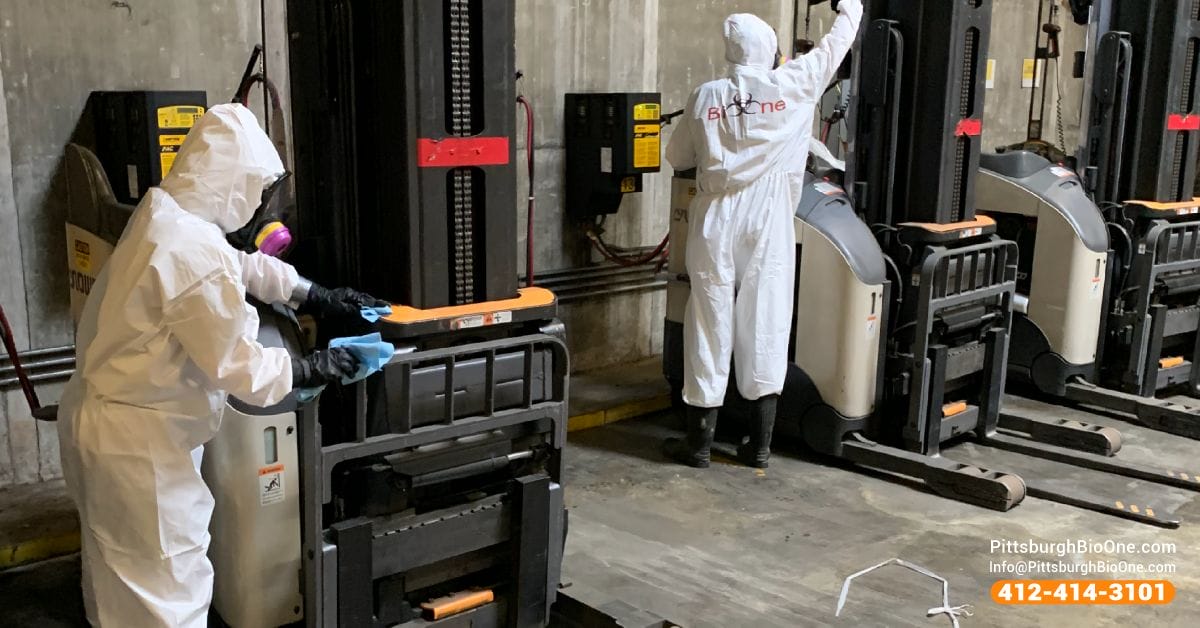
Proper disposal of biohazardous waste is essential to prevent harm to people and the environment. Incineration, autoclaving, and chemical treatment are the most common disposal procedures for biohazardous waste. Let's cover the four biosafety levels and what you can do to remain safe should you encounter them o be part of organizations dealing with these potentially infectious materials.
There are many different types of biohazards, including viruses, bacteria, and toxins. Some biohazards are naturally occurring, while others result from human activity. Bio-One is a professional biohazard cleanup company specializing in the safe and proper disposal of biohazardous waste, and our services are available 24/7/365 days a year.
What are biohazards?
A biohazard is any substance that poses a threat to the health of humans, animals, or the environment. There are many different types of biohazards, including viruses, bacteria, and toxins. Some biohazards are naturally occurring, while others result from human activity.
Biohazards can cause various health problems, including infections, poisoning, and allergic reactions. Exposure to biohazards can occur through contact with contaminated surfaces, inhalation of contaminated air, or ingestion of contaminated food or water.
Where can biohazards be present?
Biohazards can be found in many different settings, including hospitals, laboratories, industrial facilities, and homes. Crime and trauma scenes also contain potentially hazardous materials.
- Hospitals and other healthcare facilities generate large amounts of biohazardous waste, including needles, syringes, sharps, blood spills, body fluids, and tissues.
- Laboratories use biohazards in their research, including viruses, bacteria, and toxins.
- Industrial facilities may generate biohazardous waste like chemical spills due to their manufacturing processes.
- Homes may generate biohazardous waste from gardening, home renovation, and pet care.
Avoid handling biohazardous waste at all times, especially if you don't have the experience or proper training to dispose of them. These biohazardous materials pose multiple health complications from blood and airborne pathogens. Consider hiring biohazard cleanup companies like Bio-One to help you safely dispose of any contaminated materials.
What are the four biosafety levels?
Four biosafety levels (BSL) are used to describe the risk associated with different biohazards. The four BSLs are:
- BSL-1: Low Risk
- BSL-2: Moderate Risk
- BSL-3: High Risk
- BSL-4: Extreme Risk
Biosafety Level 1 (BSL-1) - Low Risk
BSL-1 is the biosafety level used for agents that pose a low risk to humans, animals, and the environment. These agents are not known to cause disease in healthy humans and are of low virulence. Examples of BSL-1 agents include Escherichia coli and Saccharomyces cerevisiae.
Biosafety Level 2 (BSL-2) - Moderate Risk
BSL-2 is the biosafety level used for agents that pose a moderate risk to humans, animals, and the environment. These agents cause disease in humans and are of moderate virulence. Examples of BSL-2 agents include Mycobacterium tuberculosis and Salmonella enterica.
Biosafety Level 3 (BSL-3) - High Risk
BSL-3 is the biosafety level used for agents that pose a high risk to humans, animals, and the environment. These agents cause serious or life-threatening diseases in humans and are of increased virulence. Examples of BSL-3 agents include HIV and Ebola virus.
Biosafety Level 4(BSL-4) - Extreme Risk
BSL-4 is the biosafety level used for agents that pose an extreme risk to humans, animals, and the environment. These agents cause fatal diseases in humans and are of exceptionally high virulence. There are no known cures for diseases caused by BSL-4 agents. Examples of BSL-4 agents include the Marburg virus and Smallpox virus.
How can you stay safe around biohazards?
Proper handling of biohazards is crucial to avoid disease outbreaks and potential health problems. Emergency personnel, doctors, research specialists, and other healthcare workers must undergo the necessary training in safely handling and disposing of any hazardous material resulting from their activities.
However, if you are faced with traumatic situations implicating any of these biosafety levels, or remnants from any industrial activity that involves dangerous pathogens, follow these recommendations:
- Avoid contact with any potential biohazards in the affected area.
- If you must enter the contaminated area, wear the appropriate personal protective equipment (PPE) like gloves, full-face respirators, hazmat, and shoewear.
- Consider hiring biohazard cleaning services to remove and dispose of any contaminated materials safely.
Professional biohazard cleanup - How Bio-One can help
If you've come into contact with a biohazard from the biosafety levels list, it's essential to seek professional help to ensure the safety of yourself and others. Bio-One is a nationwide leader in biohazard cleaning and remediation services.

Compassion. Experience. Respect.
Bio-One of Pittsburgh is always ready to assist you with any issues arising from unanticipated events, such as death and major injury. Our expert specialists are always ready to assist you in dealing with highly pressurized situations that may be emotionally and physically draining, allowing you to focus on other vital activities while healing in a sanitary environment. Locally owned and operated, we provide the following:
Biohazard remediation and decontamination services
- Crime scene cleaning
- Blood spill cleanup
- Homicide and suicide cleanup
- Unattended death cleanup
- Biohazard cleanup
- Feces and bodily fluids cleanup
- Odor removal
- Virus Disinfection
- Fentanyl cleanup
- Tear gas cleanup
- Emergency vehicle decontamination
- Sewage backup cleanup
- Medical Waste disposal
Hoarding cleanup services
- Hoarding cleanup
- Animal hoarding cleanup
- Junk removal
- Deep cleanup
- Gross filth cleanup
- Hazardous waste removal
- Homeless encampment cleanup
Help First, Business Second!
Bio-One works closely with victim support centers nationwide and local authorities, communities, emergency services personnel, hoarding task forces, apartment communities, insurance companies, and other organizations to accomplish each customer's most efficient and superior service possible.
Many crime scene cleanup companies may face unexpected, unfortunate life events. Still, Bio-One is the right choice because of our expertise and profoundly caring and discreet specialists.
We are proud members of the NAPO Pittsburgh - National Association of Productivity & Organizing Professionals!
Serving the Greater Pittsburgh / Western Pennsylvania Area!
Bio-One of Pittsburgh serves the following Pennsylvania counties: Allegheny County, Washington County, Beaver County, Butler County, Armstrong County, Westmoreland County, Lawrence County, Greene County, Fayette County, and Mercer County.
We also serve the following cities and surrounding communities: Allison Park, Aspinwall, Avalon, Bairdford, Bakerstown, Baldwin, Bellevue, Ben Avon, Ben Avon Heights, Bethel Park, Blawnox, Boston, Brackenridge, Braddock, Braddock Hills, Bradford Woods, Brentwood, Buena Vista, Bunola, Carnegie, Castle Shannon, Cheswick, Churchill, Clairton, Coulter, Crafton, Creighton, Crescent, Cuddy Curtisville, Dormont, Dravosburg, Duquesne, East Mc Keesport, East Mckeesport, East Pittsburgh, Elizabeth, Emsworth, Etna, Forest Hills, Fox Chapel, Glassport, Glenshawock, Harwick, Heidelberg, Homestead, Homewood, Indianola, Ingomar, Ingram, Jefferson Hills, Leetsdale, McKees Rocks, Millvale, Monroeville, Morgan, Mount Oliver, Munhall, Natrona Heights, Noblestown, Oakdale, Oakland, Oakland (borough), Oakmont, Pitcairn, Pleasant Hills, Plum, Port Vue, Presto, Rankin, Rennerdale, Rural Ridge, Russellton, Sharpsburg, South Park, Springdale, Sturgeon, Swissvale, Tarentum, Turtle Creek, Verona, Wall, Warrendale, West Elizabeth, Wes Homestead, West Mifflin, West View, Wexford, Whitaker, Wildwood, Wilkinsburg, and Wilmerding!
Our technicians are available 24/7/365! Contact us at 412-414-3101.


